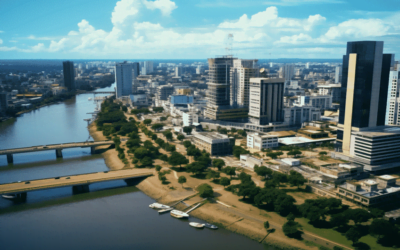Hey there, fellow drone enthusiast! If you’ve found your way here, it’s clear you’re on a mission to uncover the ins and outs of “Turkey Drone Laws.”
Whether you’re a passionate hobbyist or a professional drone operator, understanding the rules and regulations is vital to safe and enjoyable flights. Well, you’ve come to the right place because I’ve been there, done the research, and I’m here to guide you through it all.
You might be wondering how I’m so confident in answering your burning questions about Turkey’s drone laws. Well, it all began with a deep dive into the official regulations, conversations with local authorities, and hours of online research.
I’ve pored over the complexities of these laws and gained firsthand knowledge of the do’s and don’ts in Turkish airspace. Rest assured, I’m here to provide you with clear, accurate, and up-to-date information.
So, if you’re eager to explore the Turkish skies with your drone and want to ensure you’re following the law to the letter, you’re in for a treat. In this article, I’ll break down Turkey’s drone regulations step by step, addressing the specific questions you might have.
Whether it’s about registration, no-fly zones, altitude limits, or special permissions, we’ll cover it all. Stay with me, and by the end of this article, you’ll be well-prepared to take flight while staying on the right side of the law. Let’s get started!
- Background on Turkey’s Drones Laws
- Registration and Licensing
- No-Fly Zones and Restricted Areas
- Altitude Limits and Flight Restrictions
- Remote Identification and Marking
- Insurance Requirements
- Special Operations and Permissions
- Penalties and Consequences for Violations
- Final Thoughts on Turkey Drone Laws
- Frequently Asked Questions on Turkey Drone Laws
Background on Turkey’s Drones Laws

As we delve into the fascinating world of Turkey’s drone laws, it’s essential to start with a solid foundation in understanding what drones are and how they’ve become integral to our lives. So, let’s kick things off with the basics.
Definition and Types of Drones
Drones, also known as unmanned aerial vehicles (UAVs), come in a variety of shapes and sizes. They’re not just those sleek, high-tech quadcopters you see buzzing overhead.
Drones encompass a broad range of unmanned aerial systems, from tiny toy-like models to massive industrial machines. These marvels of technology are typically equipped with onboard cameras, sensors, and even advanced GPS systems.
They can be controlled remotely or programmed to fly autonomously. Understanding the different types and capabilities of drones is crucial as we navigate Turkey’s drone regulations.
Use Cases and Applications of Drones in Turkey
Now, let’s talk about the exciting part – what are people doing with all these drones in Turkey? The use cases and applications are as diverse as the drones themselves. Drones are no longer just for aerial photography and videography.
In Turkey, they’re being employed in agriculture to monitor crops, in search and rescue operations to reach remote areas, and in construction to assess project progress.
They’re also used in environmental monitoring, power line inspections, and even for delivery services. The sky is not the limit; it’s a playground for creativity and innovation.
The Growth of the Drone Industry in the Country
You might be wondering why drones have become so prevalent in Turkey. Well, it’s not a coincidence. The drone industry has experienced significant growth in recent years, and Turkey is no exception.
With increasing interest from hobbyists and professionals alike, the drone market has boomed. More local businesses are integrating drone technology into their operations, leading to a surge in innovation and economic impact.
Turkey has recognized the potential of drones and is embracing this technology while also ensuring that it’s regulated for safety and privacy. It’s this growth and dynamism that make understanding Turkey’s drone laws so important – to ensure that this exciting field continues to thrive while keeping everyone safe.
Also Read: Drone Laws in Tunisia 2024
Registration and Licensing

Now, let’s talk about the nitty-gritty details when it comes to flying drones in Turkey. Registering your drone and obtaining the necessary licenses might not be the most thrilling part of the drone journey, but it’s an essential step to ensure safe and responsible operations.
Drone Registration Requirements
Drone registration in Turkey is a fundamental requirement, and it’s a lot easier than you might think. To get started, you’ll need to head over to the Turkey Directorate General of Civil Aviation (DGCA) website. There, you’ll find an online registration process that’s relatively straightforward. You’ll provide the necessary details about your drone, including its make, model, and serial number, along with your own information as the operator. Registering your drone helps the authorities keep track of who’s flying what in the Turkish airspace, and it’s a vital step in ensuring the safety of all involved.
Drone Operator Licensing
For those of you planning to take your drone endeavors to a more professional level, this is where you’ll want to pay close attention. Commercial drone operations in Turkey require a special license.
Now, the application process for this might not be as simple as registering your drone, but it’s certainly worth the effort. It allows you to legally offer drone services, whether it’s for aerial photography, mapping, or any other commercial application.
Another point to note is that if your drone weighs over 4 kilograms, you’ll also need to obtain a specific license for its operation. These licenses ensure that the bigger and potentially riskier drones are operated by qualified individuals.
The Significance of Registration and Licensing in Turkey
You might be wondering why all this registration and licensing is necessary. Well, it all boils down to safety, accountability, and responsibility.
Turkey, like many other countries, has implemented these measures to ensure that drones are used in ways that don’t compromise the safety of people and property. It’s about knowing who’s operating these machines and making sure they understand the rules and regulations.
It may seem like a bit of paperwork and a few extra steps, but it’s an investment in keeping the skies safe for everyone.
So, whether you’re just flying for fun or taking your drone operations to the next level, rest assured that Turkey’s registration and licensing requirements are in place to make sure everything goes smoothly in the air.
Also Read: Drone Laws in Trinidad and Tobago 2024
No-Fly Zones and Restricted Areas

Now, let’s talk about the airspace do’s and don’ts when it comes to drone flying in Turkey. Knowing where you can and can’t take your drone is pivotal to safe and legal operations.
Explanation of No-Fly Zones in Turkey
You might wonder, why are there no-fly zones in the first place. Well, it’s all about ensuring safety and national security. Turkey designates specific areas as no-fly zones, and these are places where drone operations are entirely restricted.
These areas include military installations, government buildings, and airports, as well as the surrounding airspace. Flying your drone over these sensitive locations isn’t just discouraged; it’s illegal. It’s essential to respect these restrictions and maintain a safe distance to avoid any unintentional violations.
How to Access and Interpret the Latest Maps of Restricted Zones
So, how can you keep track of these no-fly zones and restricted areas in Turkey? Luckily, technology has made this quite accessible. The Directorate General of Civil Aviation (DGCA) provides updated maps and information about these zones on their website.
You can access these maps to plan your flights and understand where the restrictions are in place. When interpreting these maps, look out for specific markings and coordinates that indicate no-fly areas. Being well-informed about the latest maps is crucial to avoid inadvertent violations.
Penalties for Violating No-Fly Zone Regulations
Now, you might be thinking about the consequences of breaking these no-fly zone regulations. Turkey, like most countries, takes these restrictions seriously. Violating no-fly zones can result in fines, confiscation of your drone equipment, and, in severe cases, legal consequences.
The penalties are in place to ensure that drone operators respect the boundaries set for safety and national security. So, it’s crucial to be aware of these restrictions and operate your drone responsibly. In the end, it’s all about enjoying your drone hobby or profession while ensuring the safety of all involved.
Also Read: Drone Laws in Tonga 2024
Altitude Limits and Flight Restrictions

When you’re out there with your drone, soaring in the Turkish skies, you want to make sure you’re not just having a blast but also following the rules. Altitude limits and flight restrictions are your guiding stars to ensure safe and responsible drone operations.
Overview of Altitude Restrictions for Drone Flights
Let’s start with the altitude question. How high can your drone go? Turkey has regulations in place to limit the altitude of drone flights, and these rules are in place for safety and security reasons. They’re intended to keep drones clear of traditional manned aircraft and ensure they don’t pose a danger to people and property on the ground.
Rules for Drone Flights Near People and Property
It’s not just about the altitude; it’s also about where you’re flying. When it comes to drones, there’s a rule of thumb – fly responsibly near people and property. While you may be eager to capture those breathtaking aerial shots, it’s essential to maintain a safe distance from individuals and structures. These rules are in place to prevent accidents and protect privacy. Nobody wants a drone to crash into their backyard barbecue, right?
Safety and Privacy Considerations
Speaking of privacy, it’s not just about the physical safety of your drone but also the privacy of individuals. It’s crucial to respect people’s right to privacy when flying your drone. Avoid hovering around private properties and intruding on someone’s personal space. Privacy and safety go hand in hand in responsible drone operation.
Current Altitude Limits in Turkey
So, you might be wondering what the specific altitude limits are in Turkey. Well, as of my last update in September 2021, drones were generally not allowed to fly above 120 meters (approximately 394 feet). These limits are subject to change, so always check for updates and adhere to the most recent regulations to ensure a smooth and lawful flight. Safety and responsibility should be your guiding principles when navigating the skies with your drone in Turkey.
Also Read: Drone Laws in Togo 2024
Remote Identification and Marking

Now, let’s talk about a crucial aspect of drone ownership and operation in Turkey: remote identification and marking. It’s not just about flying your drone; it’s also about ensuring it’s easily identifiable and traceable for safety and accountability.
The Requirement for a Unique Identification Mark on Drones
One of the key requirements for drone operators in Turkey is marking your drone with a unique identification number. This identification mark is like your drone’s license plate. It’s a way to distinguish your drone from others and ensure that authorities can identify the owner/operator in case of any incidents or violations. Think of it as a digital fingerprint for your drone.
Visibility and Location of the Identification Mark
Where you place this identification mark is just as important as having it. The mark should be visible and easily accessible on your drone. It’s typically located on the exterior, and it should be in a position where it can be seen without dismantling the drone. The purpose here is to make sure that in the event of any issues or questions, authorities can quickly locate and read the identification mark.
The Purpose of Remote Identification
So, why is this remote identification mark so important? It’s all about accountability and responsibility. In the unlikely event of an incident or if someone observes a drone flying where it shouldn’t be, having this identification mark helps authorities trace the owner or operator. It’s a critical tool for maintaining the safety and security of the airspace.
Implications for Drone Owners and Operators
For drone owners and operators, this requirement means a little extra effort when setting up and maintaining your drone. It’s a responsibility that comes with the privilege of flying in the Turkish skies.
Ensuring that your drone is properly marked is not just about following the law; it’s also about being a responsible drone enthusiast. It’s all part of ensuring that drone operations in Turkey are both enjoyable and safe.
Also Read: Drone Laws in Thailand 2024
Insurance Requirements

We’re moving into another critical aspect of drone operation in Turkey: insurance. It’s not just about following the rules and regulations; it’s also about ensuring that you’re covered in case of any unforeseen incidents.
The Importance of Drone Insurance
Drone insurance may not be the first thing that comes to mind when you’re excited about flying your drone, but it’s a vital piece of the puzzle. It’s all about mitigating risks and taking responsibility for your actions. Accidents can happen, and insurance is there to provide that safety net. It’s a must-have for anyone operating drones, whether for fun or professionally.
Mandatory Insurance Coverage for Potential Damages or Accidents
In Turkey, having insurance coverage for potential damages or accidents caused by your drone is mandatory. This requirement isn’t about burdening you with extra costs; it’s about ensuring that any unintended harm or damage caused by your drone is covered.
This helps protect both the drone operator and the public. It’s a win-win situation when it comes to safety and peace of mind.
The Role of Insurance in Protecting Drone Operators and the Public
Think of drone insurance as a safety net, not just for you but for the people and property around you.
If your drone were to, heaven forbid, crash into someone’s car or cause injury, insurance would step in to cover the costs and ensure that the affected parties are compensated. It’s all about being a responsible drone operator, protecting your assets, and ensuring that you’re not putting anyone at risk. So, while it might seem like a small detail, insurance plays a massive role in the grand scheme of responsible drone operations in Turkey.
Also Read: Drone Laws in Tanzania 2024
Special Operations and Permissions

Now, let’s explore the world of special drone operations and the permissions you might need to undertake them. These are the scenarios that go beyond the typical recreational flights and require a little extra paperwork.
Overview of Special Drone Operations
Special drone operations can range from anything like night flights to capturing footage in densely populated areas. These scenarios often involve a higher level of risk and require additional permissions to ensure they’re carried out safely and responsibly. Understanding the scope of these operations and what they entail is crucial.
Obtaining Specific Permissions for Special Operations
For special operations, you’ll need to obtain specific permissions from the Directorate General of Civil Aviation (DGCA) in Turkey. These permissions are not just a formality; they’re in place to ensure that you’re well-prepared and qualified for these specialized activities. This process might involve detailed applications, safety assessments, and sometimes even a demonstration of your capabilities.
Licensing and Authorization Processes for Specialized Drone Activities
In some cases, special operations may require specific licensing beyond the standard drone operator license. These specialized licenses demonstrate that you have the expertise and training needed for these unique scenarios.
It’s all about ensuring that you’re equipped to handle these operations safely and without putting others at risk. While the extra steps might seem like a hassle, they’re there to maintain the highest level of safety in the world of drones.
So, if you’re thinking about embarking on specialized drone activities in Turkey, make sure to navigate the licensing and authorization processes thoroughly. It’s all part of being a responsible and skilled drone operator.
Also Read: Drone Laws in Tajikistan 2024
Penalties and Consequences for Violations

Now, it’s time to discuss something we’d all rather avoid – the penalties and consequences for violations of drone regulations in Turkey. Yes, it’s not all fun and games, and knowing the potential repercussions is crucial.
Consequences of Violating Drone Regulations in Turkey
If you find yourself on the wrong side of the drone regulations in Turkey, you could be facing some serious consequences. Violations can lead to fines, equipment confiscation, and even legal repercussions. It’s not about scaring you, but about understanding the importance of following the rules.
Fines, Equipment Confiscation, and Legal Repercussions
So, what are these penalties? Well, they can range from fines that can significantly dent your wallet to the confiscation of your drone equipment. In severe cases, particularly for repeated or severe violations, legal repercussions might come into play.
We’re talking about potential legal action and criminal charges. It’s not something anyone wants to deal with, but it’s the reality if you don’t follow the rules. It’s all in place to maintain the safety and security of drone operations in Turkey.
The Importance of Responsible Drone Operation
Understanding these potential consequences highlights the significance of responsible drone operation. It’s not just about flying your drone; it’s about understanding the rules, and regulations, and the importance of safety and accountability.
By adhering to the laws and being a responsible drone operator, you’re not only protecting yourself from penalties but also ensuring the safety of others and the continued enjoyment of the drone hobby. Remember, it’s all part of maintaining a positive and responsible drone community.
Also Read: Drone Laws in Taiwan 2024
Final Thoughts on Turkey Drone Laws

As we wrap up our exploration of Turkey’s drone laws, let’s take a moment to recap the key points and reflect on the significance of responsible drone operations in this beautiful country.
We’ve covered a lot of ground, from registration and licensing to no-fly zones, altitude limits, insurance requirements, special operations, and the consequences of violations.
These are the building blocks of a safe and responsible drone community in Turkey. It’s crucial to understand and follow these rules, ensuring that your drone operations are not only enjoyable but also safe and respectful of others and the law.
In the ever-evolving world of drone technology and regulations, staying informed is key. Regulations can change, and it’s your responsibility to keep up to date with the latest rules and requirements.
Compliance isn’t just a legal obligation; it’s a commitment to ensuring that drone operations remain safe and secure. It’s about being a responsible drone operator and contributing to a positive drone community.
With the right knowledge and a commitment to safe and responsible drone use, we can contribute to the growth of the drone industry in Turkey.
Whether you’re a hobbyist capturing stunning landscapes or a professional using drones for various applications, it’s a world full of possibilities. Let’s embrace these opportunities while keeping safety and accountability at the forefront of our drone adventures.
By doing so, we can ensure that the skies of Turkey remain open for all drone enthusiasts, today and in the future. So, go out there, fly high, and always operate your drone with responsibility and respect. Happy flying!
Frequently Asked Questions on Turkey Drone Laws
Do I need to register my drone in Turkey, and how do I do it?
\Yes, you must register your drone in Turkey. To do so, you can visit the Directorate General of Civil Aviation (DGCA) website, where you’ll find an online registration process. You’ll need to provide details about your drone, including its make, model, and serial number, along with your information as the operator.
What are the altitude limits for drone flights in Turkey?
As of the last update in September 2021, drones in Turkey were generally not allowed to fly above 120 meters (approximately 394 feet). However, altitude limits may change, so always check for the most recent regulations.
Can I fly my drone over sensitive areas like military installations and government buildings?
No, flying drones over military installations and government buildings is strictly prohibited in Turkey. These are considered no-fly zones, and violating this regulation can result in fines, equipment confiscation, and legal consequences.
Is drone insurance mandatory in Turkey, and why do I need it?
Yes, drone insurance is mandatory in Turkey. It’s essential because it provides coverage for potential damages or accidents caused by your drone. This requirement is in place to protect both the drone operator and the public from unforeseen incidents.
How do I obtain permission for special drone operations in Turkey?
Special drone operations require specific permissions from the DGCA. The process may involve detailed applications, safety assessments, and sometimes a demonstration of your capabilities. In some cases, specialized licenses may be necessary for specific operations beyond the standard drone operator license.













